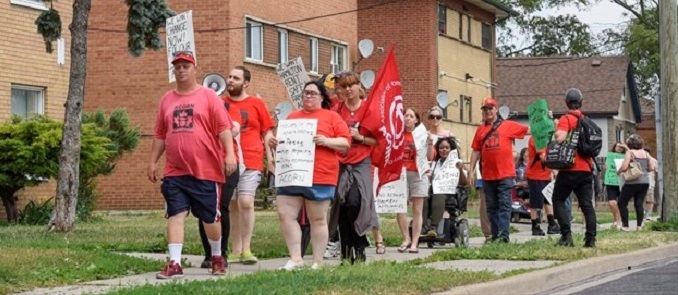The Hamilton Spectator: East Hamilton rental woes: ‘March on Melvin’ demands action
Posted June 19, 2018
Tenants of buildings want the city to review bylaws and take proactive approach to inspections
Posted June 19, 2018
A group of tenants in northeast Hamilton is demanding the city do a better job at enforcing property standards at local apartment blocks.
The city should review bylaws and create a landlord registration system to proactively stamp out problems such as bedbugs and busted balconies, demonstrators said Monday.
“I’d like to see them actually come out and check out the apartments. Come out and take a look see if it’s in good repair,” said Patricia Gould, who lives in a Melvin Avenue building.
Led by slogans blared through a megaphone, about 20 marchers wearing red T-shirts and waving signs marched past a ribbon of older apartment buildings on Melvin between Woodward and Parkdale avenues.
The demonstration comes in an era of escalating rents, squeezing some lower-income tenants out of the market.
ACORN Hamilton, which helped organize the march, says it has support in 10 buildings and more than 100 members. The campaign is asking the city to establish RentSafe Hamilton.
In Toronto, for instance, RentSafeTO requires apartment buildings with three or more storeys and 10 or more units to register, pay fees and follow regulations or be subject to financial penalties.
It outlines rules for hiring contractors, repairs, cleanliness, pest management, record-keeping, renting to new tenants, notifications, service requests and waste management.
ACORN Hamilton says a “reasonable” fee charged to Hamilton landlords would help pay for proactive enforcement.
The city has considered and rejected licensing in the past.
But Monday’s marchers said, as it stands, bylaw efforts are falling short.
Gould, who has two roommates, said she works two part-time jobs that pay minimum wage to be able to afford her apartment, which goes for just over $1,000 a month.
A water heater that burst above her unit caused a part of the ceiling to fall down, but it hasn’t been repaired, she said. “It’s been four months.”
Brendan Jowett, a lawyer with the Hamilton Community Legal Clinic, said Toronto’s bylaws also cover appliances, but Hamilton’s do not. “So if your stove doesn’t work, that’s not a city problem.”
He said a complaint-driven system doesn’t favour tenants, who face language barriers, fear eviction and typically don’t have a firm grip of legalese to take on landlords. “Really, what this means is we are relying on the weakest actors in the system to enforce maintenance standards.”
Coun. Sam Merulla, who represents Ward 4, plans to meet with the Melvin residents next week.
Merulla told The Spectator that tenants should seek redress before the provincial Landlord and Tenant Board, which is specially set up to deal with such disputes.
Municipal officers are too thinly spread to respond to scores of bylaws proactively, he said.
There are exceptions, Merulla said, noting proactive enforcement of dumping, graffiti and trespassing at Albion Falls.
“On this front, it’s definitely possible to look at the feasibility, but like everything else, it would have a budgetary impact.”
Jowett also said the city is reluctant to issue orders for pests like bedbugs unless presented with a live specimen, “which is outrageous.”
The city’s healthy environments division will conduct a “thorough check for evidence of an infestation,” spokesperson Aisling Higgins said, noting “responsibilities on both sides.”
“They do not resort to heavy-handed action immediately if they can get both parties working together. … Legal action is a last resort to get compliance as it ends up taking much longer to resolve the actual pest problem,” Higgins added.
The legal clinic recently helped 12 Syrian refugee families resolve a dispute over bedbugs at 221 Melvin Ave.
***
Article by Teviah Moro for the Hamilton Spectator

